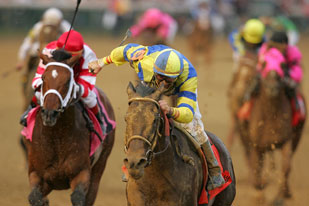Throughbreds joins doping probe
Horseracing becomes the latest sport in the United States to tackle steriods.

 |
| Action from the 133rd Kentucky Derby [GALLO/GETTY] |
The president of the U.S. Thoroughbred Racing Association has agreed to testify in front of a U.S. congressional panel investigating doping.
Although most of the focus of the investigation has been on Major League Baseball and other team sports, thoroughbred racing also is trying to enact a national ban on performance-enhancing drugs, at least for the days leading up to races.
“I think the perception is drug use in racing is worse now than maybe it’s ever been,” said congressman Ed Whitfield.
“There have been many individual veterinarians, prominent breeders and owners who are quite frustrated.”
NTRA president Alexander Waldrop will join representatives from MLB, the NFL, NBA and NHL, as well as officials with university and high school sports, at the February 27 hearing in front of the House Energy and Commerce Committee’s panel on commerce, trade and consumer protection.
Waldrop’s spokesman said he was traveling on Friday and couldn’t immediately be reached.
In a statement, Waldrop said, “The NTRA welcomes this opportunity to continue its dialogue with Congress on the matter of medication in pari-mutuel horse racing.”
While Waldrop and other racing officials have spoken with lawmakers in Washington, the hearing will provide a more public approach to addressing the issue.
Last year, a trade association that represents state horse racing commissions agreed to a model rule that calls for steroid testing to be adopted nationwide no later than December 2008.
While the stipulation likely won’t immediately provide a blanket ban on steroids, the tests will be designed to make sure horses didn’t receive injections within at least a month before a race.
Can’t bury their heads
Scot Waterman, executive director of the Racing Medication and Testing Consortium, said steroid shots once were relatively common and somewhat benign, providing a one-time jolt to horses that weren’t responding well to training.
Now, some trainers are trying to put the animals through steroid regimens that could affect competition and ultimately harm the animals, Waterman said.
“Given what is happening in other major league sports, we didn’t feel like we could bury our head in the sand on this,” Waterman said.
Some states have already implemented steroid testing, but Kentucky is among those still researching options.
Lisa Underwood, executive director of the Kentucky Horse Racing Authority, said it’s unlikely the rules will be in place in time for this year’s Kentucky Derby.
Horse racing officials point out that their athletes for years have been subjected to far more drug testing than those in any other major U.S. sport.
Typically, the winner and a random selection of other competitors goes to the testing barn after a race.
But the focus was usually on other performance-enhancers rather than steroids, which were perceived to have only a minor affect improving racing ability.
Larry Bramlage, a veterinarian with Rood and Riddle hospital in Lexington, says he supports a ban to bring racing into line with other sports, but he predicts there will be some fallout.
For example, geldings often are given steroids to make up for lost testosterone, Bramlage says, and a steroid ban could effectively push them out of the racing picture.